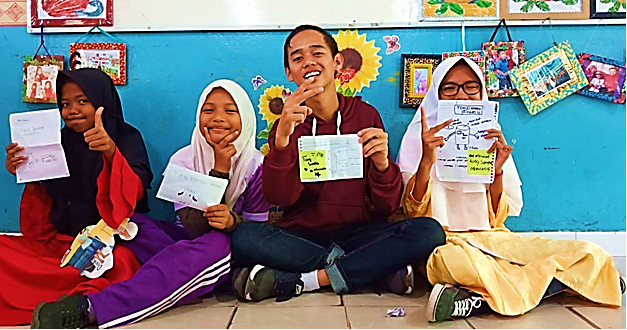Pelatihan Tech for Kids untuk Meningkatkan Kesadaran dan Peminatan Siswa tentang Rekayasa sebagai Jalur Karir Tech for Kids Training to Improve Student Awareness and Planning about Engineering as a Career Path
Main Article Content
Abstract
Riau Islands Province requires the readiness of Human Resources (HR) who are able to compete in the global market, with its position next to neighboring Malaysia and Singapore can be an advantage and also a weakness if HR is unable to compete globally. Therefore, the electrical engineering department with the tech for kids program seeks to provide personality and technical skills training to elementary and secondary school children in the coastal areas of Tanjung Pinang. The tech for kids program focuses on understanding the engineering design process to be able to produce innovations and products that are able to compete globally and on target. Activities that are carried out routinely weekly are accompanied by students as facilitators who will assist the supervisor during the training. The pattern of training and learning that integrates the technical ability of design using Autodesk inventors with non-technical forms of the ability to think innovatively, critically, and be able to work together with friends in a group will create a superior personality in the era of the industrial revolution 4.0. The training results obtained satisfactory results where students can attend the training enthusiastically and still remain enthusiastic until the end of the activity. The limited use of computer equipment is not an obstacle in the implementation in the field because students are able to manage training schedules well.
Downloads
Article Details
Authors who publish with this journal agree to the following terms:
- Any article on the copyright is retained by the author(s).
- Author grant the journal, right of first publication with the work simultaneously licensed under a Creative Commons Attribution License that allows others to share work with acknowledgment of the work authors and initial publications in this journal.
- Authors are able to enter into a separate, additional contractual arrangements for non-exclusive distribution of published articles of work (eg, post-institutional repository) or publish it in a book, with acknowledgment of its initial publication in this journal.
- Authors are permitted and encouraged to post their work online (e.g., in institutional repositories or on their websites) prior to and during the submission process, as can lead to productive exchanges, as well as earlier and greater citation of published work.
- The article and any associated published material is distributed under the Creative Commons Attribution-ShareAlike 4.0 International License
References
Kastner, S., Knight, R.T. 2017. Bringing Kids into the Scientific Review Process. Neuron. 93(1):12-14. https://doi.org/10.1016/j.neuron.2016.12.002
Lucas, B., Hanson, J. 2016. Thinking Like an Engineer: Using Engineering Habits of Mind and Signature Pedagogies to Redesign Engineering Education. International Journal of Engineering Pedadogy. 6(2):4-13.
Łukaszewicz, K. 2017. Use of CAD Software in the Process of Virtual Prototyping of Machinery. Procedia Engineering. 182:425-433. https://doi.org/10.1016/j.proeng.2017.03.127
Nusyirwan, D., Prayetno, E., Singer, H.A., Nugraha, S., Yunianto, A.H., Suhendra, T., Hadi, A., Shafira, A., Oktavia, D., Sinaga, L.A. 2019a. Pelatihan Edutech For Children Untuk Meningkatkan Kemampuan Teknis Dan Melatih Pola Pikir Inovatif Siswa. Logista: Jurnal Ilmiah Pengabdian kepada Masyarakat. 3(2):187-198. https://doi.org/10.25077/logista.3.2.187-198.2019
Nusyirwan, D., Suhendra, T., Fadillah, M.A., Saputra, O.I. 2019b. Tech for Kids Sebagai Pelatihan Pengenalan Proses Perancangan Rekayasa Di Smpn 11 Tanjung Pinang. Jurnal Pemberdayaan: Publikasi Hasil Pengabdian Kepada Masyarakat. 3(2):159-172. https://doi.org/10.12928/jp.v3i2.885
Nusyirwan, D. 2018. Design Thinking Sebagai Bridge of Innovation Perguruan Tinggi dan Industri di Jurusan Teknik Elektro Universitas Maritim Raja Ali Haji (UMRAH). Jurnal Sustainable: Jurnal Hasil Penelitian dan Industri Terapan. 7(2):86-94. https://doi.org/10.31629/sustainable.v7i2.451
Pangestu, M.Y., Wijaya, S.B., Ajay, A., Oktavia, D., Amrullah, M.Z., Ahmadi, A., Nugraha, H.A. 2019. Peran Perguruan Tinggi Melalui Tech for Kids Dalam Usaha Mendorong Siswa Minat Terhadap Ilmu-Ilmu Teknik. In Prosiding Seminar Nasional Pengabdian Masyarakat LPPM UMJ Semnaskat 2019. Jakarta: Universitas Muhammadiyah Jakarta.
Tovey, M., Porter, S., Newman, R. 2003. Sketching, concept development and automotive design. Design Studies. 24(2):135-153. https://doi.org/10.1016/S0142-694X(02)00035-2
Wang, Z. 2011. Interactive virtual prototyping of a mechanical system considering the environment effect. Part 2: Simulation quality. Comptes Rendus Mécanique. 339(9):605-615. https://doi.org/10.1016/j.crme.2011.06.003
Wind, S.A., Alemdar, M., Lingle, J.A., Moore, R., Asilkalkan, A. 2019. Exploring student understanding of the engineering design process using distractor analysis. International Journal of STEM Education. 6:4. https://doi.org/10.1186/s40594-018-0156-x
Yim, H., Lee, K. 2015. Preliminary Modular Design for Electric Personal Mobility with Design-Engineering Collaboration. World Electric Vehicle Association. 7(3):426-435. https://doi.org/10.3390/wevj7030426
